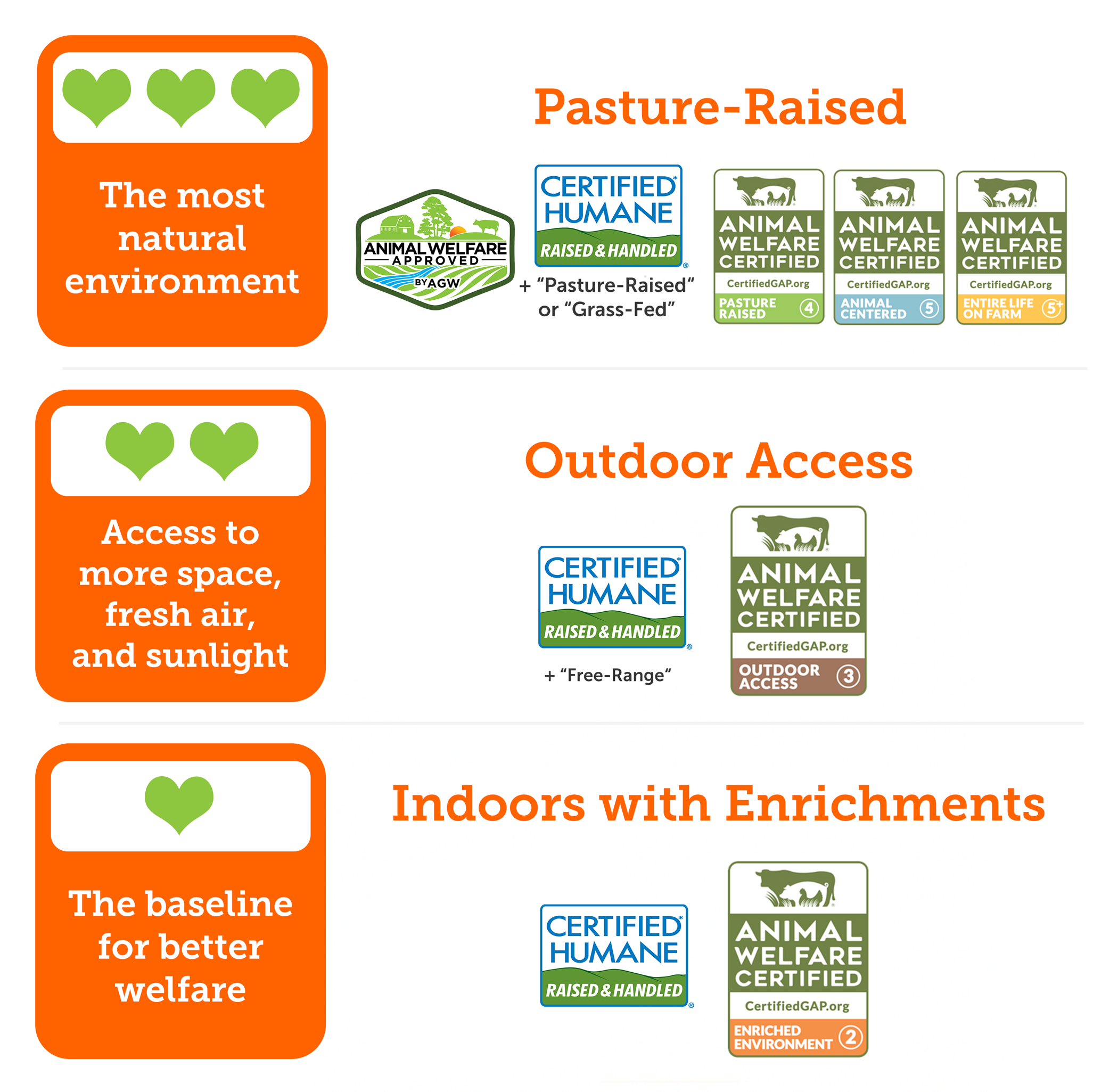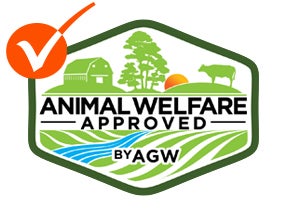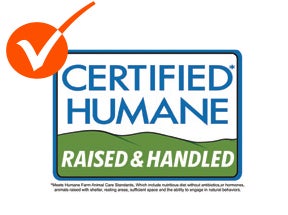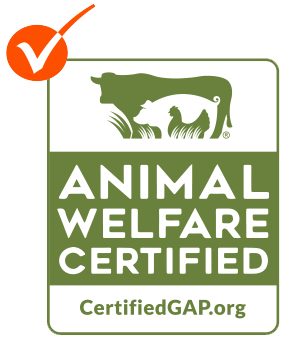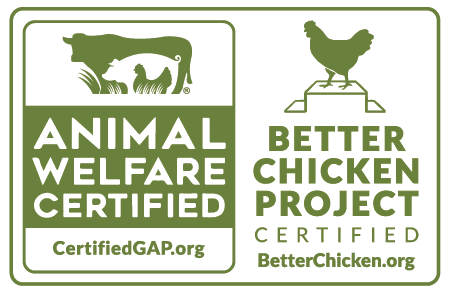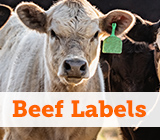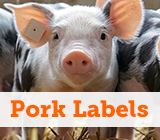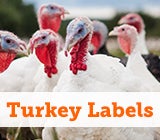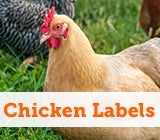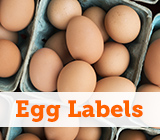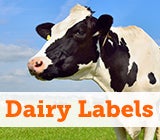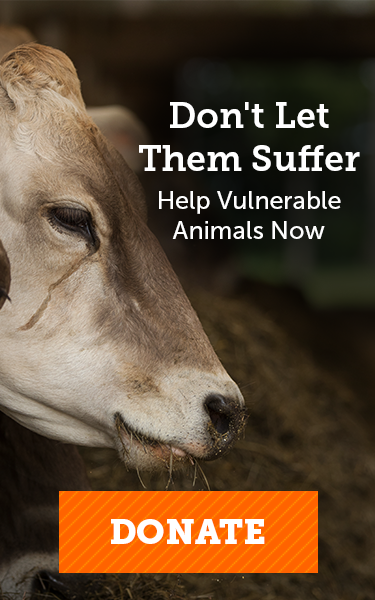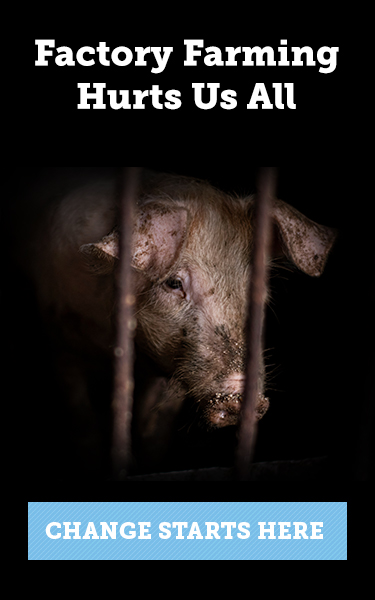Common Claims | ASPCA Recommended Certifications | Other Certifications | Further Resources
Common Claims
The terms below, which often appear on the packaging of meat, egg and dairy products, may indicate better animal welfare but lack strong standards and have no on-farm verification processes, meaning farm conditions and the treatment of animals vary widely across producers.
ASPCA-Recommended Certifications
The ASPCA has identified three independent and meaningful welfare certification programs that ban unacceptable factory farming practices and provide a better life for animals through their standards and farm audits: Animal Welfare Approved, Certified Humane, and Global Animal Partnership. These certifications’ standards range from raising animals indoors with added enrichments, which the ASPCA considers to be baseline for better animal care, to outdoor access where animals have access to more space, fresh air, and sunlight, to pasture raised where animals have reliable access to space and growing vegetation – generally the highest welfare farming model.
The below chart shows where the ASPCA-recognized certifications fall with respect to these three types of higher welfare farming. Note that some certifications have multiple levels, different meanings for different species*, or are strengthened by the presence of additional claims on the package. To learn more about each of these programs as they relate to each species, and how they compare to each other, review our species-specific label comparison charts.
A fully pasture-based animal welfare certification program, available only to smaller, independent family farms.
Strengths: Requires continuous access to pasture or range for all animals. Feedlots, cage confinement, added hormones and subtherapeutic (preventative or growth-promoting) antibiotics prohibited. Standards extend to breeding animals, transport and slaughter. Standards ensure higher-welfare breeds for animals. 100% compliance verified by auditors on every farm every 12 months.
Limitations: Focus on small farms makes it difficult for larger retailers to consistently offer AWA-certified products, but they often are found at farmers markets and smaller retailers/co-ops.
This optional, additional certification is earned by Animal Welfare Approved (AWA)-certified producers who are also verified by A Greener World for feeding their animals a 100% grass and forage diet from weaning onward. The Certified Grassfed by AGW label only applies to AWA beef and dairy cattle, meat and dairy sheep, meat and dairy goats, and bison.
An animal welfare certification program that includes both enriched indoor and free-range/pasture-based standards, available to farms of all sizes and structures. To find products that meet Certified Humane’s additional distinctions for free-range, pasture-raised and grass-fed products, look for the Certified Humane logo and those respective claims on product packaging. These claims are optional, but Certified Humane provides specific guidance to producers about the practices involved in order to be able to use additional claims.
Strengths: Requires continuous outdoor access for ruminants (cows, goats, sheep). If animals are raised indoors, more space, bedding and enrichment are required than is typical on conventional farms. Cage confinement, added hormones and subtherapeutic antibiotics prohibited. Standards extend to transport and slaughter. Many Certified Humane brands/farms are widely available from larger retailers.
Limitations: Outdoor access not required for birds and pigs. Unless the words “free-range” or “pasture” also appear on the package, assume pork, poultry and egg products come from farms without outdoor access. Feedlots for cows permitted for limited periods, with standards for space, shade and windbreaks that are lacking on conventional feedlots. Standards do not extend to breeding animals, nor do they ensure higher-welfare breeds for animals, including broiler chickens.1 100% compliance verified by auditors on-farm every 12 months, except for Certified Humane “producer groups” and “beef marketing groups,” wherein participating farms conduct a percentage of their own audits. It is not possible to determine which products are from “producer group” or “beef marketing group” arrangements.
Global Animal Partnership® (G.A.P.)
An animal welfare certification program that includes both enriched indoor and free-range/pasture-based standards, available to farms of all sizes and structures, except dairy farms. The program has a six-level rating system where each successive level represents progressively higher welfare and includes all the requirements of those below it.
| Level 1 | Cages and crates prohibited. Animals can be kept fully indoors or on feedlots. Environmental enrichments required for some species. |
| Level 2 | Animals kept indoors, environmental enrichments required for all species. |
| Level 3 | Continuous outdoor access required. |
| Level 4 | Continuous access to pasture required. Feedlots prohibited. |
| Level 5 | All physical alterations prohibited. |
| Level 5+ | Animals must spend entire lives on one farm. Off-site transport prohibited, including for slaughter. |
Strengths: Levels 3 and above require continuous outdoor/pasture access. If animals are raised indoors, more space and bedding are required than is typical on conventional farms. Cage confinement, added hormones and subtherapeutic antibiotics prohibited at all levels. Standards extend to breeding animals, transport and slaughter. 100% compliance verified by auditors on every farm every 15 months.
Limitations: Levels 1-2 do not require outdoor access. Level 1 requires enrichment for some, but not all species raised indoors. Only the G.A.P. Better Chicken Project label (see below) ensures higher-welfare chicken breeds for animals Producers can use a basic G.A.P. label without a corresponding level number on their products, making it difficult to identify (consumers must look for separate language on the package identifying the product’s level). G.A.P. products can be found in Whole Foods Markets but are expanding into other retailers.
This is an additional certification available to G.A.P. animal welfare-certified chicken producers, indicating that they have chosen one of G.A.P.’s Better Chicken Project eligible breeds associated with indicators of better welfare. For chicken products that meet G.A.P.’s animal welfare standards and breed eligibility criteria, look for the combined Animal Welfare Certified and Better Chicken Project Certified label on our Grocery List.
Other Certifications
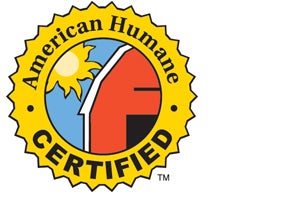
An animal welfare certification program that includes both indoor and free-range standards, available to farms of all sizes and structures.
Strengths: If animals are raised indoors, more space is required than is typical on conventional farms (but still less than in other animal welfare certifications). Prohibits added hormones. Standards extend to breeding animals, transport and slaughter.
Limitations: Outdoor access not required for any animals and enrichments not required in indoor housing. Does not prohibit cage confinement or subtherapeutic antibiotics. Feedlots permitted, with standards for space, shade and mud that are lacking on conventional feedlots. Standards do not ensure higher-welfare breeds for animals. Compliance verified by auditors on every farm every 12 months, but only 85% of the AHC-defined non-essential standards must be met to pass inspection. Therefore, it is not possible to know which standards a certified farm is actually meeting.
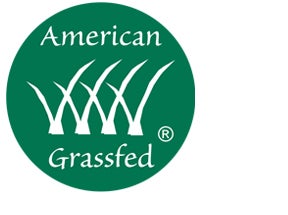
American Grassfed Association®
A grass-fed certification program with pasture-based standards, available to farms of all sizes and structures.
Strengths: Requires continuous access to pasture for all animals (cows, goats, sheep and pigs) and a diet of 100% grasses. Feedlots, cage confinement, added hormones and subtherapeutic antibiotics prohibited. 100% compliance verified by auditors on farm every 12-15 months.
Limitations: No dedicated animal welfare or handling standards and standards do not extend to breeding animals, transport or slaughter, nor do they ensure higher-welfare breeds for animals.
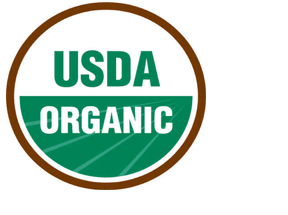
An organic certification program that requires outdoor access for animals, but does not properly enforce that requirement, and is available to farms of all sizes and structures.
Strengths: Added hormones and subtherapeutic antibiotics prohibited. Compliance is verified by auditors on every farm every 12 months, but enforcement of key standards, such as outdoor access, varies widely.
Limitations: Claims to require outdoor access, but space, duration and quality of that access is not defined and varies widely between farms. (For example, access to screened-in porches on hard, concrete flooring qualifies as “outdoor access” for egg-laying hens.) Does not prohibit feedlots, cage-confinement, set minimum space standards or require enrichments when animals are indoors. Standards do not extended to breeding animals, transport or slaughter, nor do they ensure higher-welfare breeds for animals.
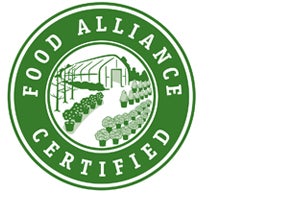
A sustainable agriculture certification program that includes both indoor and free-range/pasture-based standards, available to farms of all sizes and structures.
Strengths: Cage confinement, added hormones and subtherapeutic antibiotics prohibited. Standards extend to transportation. Certified producers must commit to continually improving practices.
Limitations: Outdoor access not required for any animals. Does not prohibit feedlots or require enrichments when animals are indoors. Standards do not extend to breeding animals or slaughter, nor do they ensure higher-welfare breeds for animals. Compliance verified by auditors on every farm, but only every three years. Producers only need to average a score of 3 out of 4 on the Alliance’s non-fixed animal handling and welfare standards to pass inspection. Therefore, it is not possible to know which standards a certified farm is actually meeting.

An industry-created certification program that claims to address animal welfare, human health and environmental protection, but is essentially an industry marketing tool. The program is currently limited to chicken and turkey products.
Strengths: None
Limitations: This program lacks adequate animal, human or environmental health standards or oversight, despite claiming these issues as core principles. The OHC standards allow producers to choose among American Humane Certified™ certification or voluntary industry guidelines set by either the National Chicken Council or the National Turkey Federation. All three options reflect conventional, industrial practices and do not ensure higher-welfare for animals. By aligning with these programs, OHC does not require meaningful stocking density limits, lighting schedules, environmental enrichment or healthy breeds, all of which are key components of improved poultry welfare. In addition, OHC allows for routine use of medically important antibiotics for disease treatment and control, without addressing the underlying causes of disease, including poor welfare.
Supermarket and Restaurant Request Letter
1As of 2024, the ASPCA will only recognize chicken welfare certifications that require better breeds.
